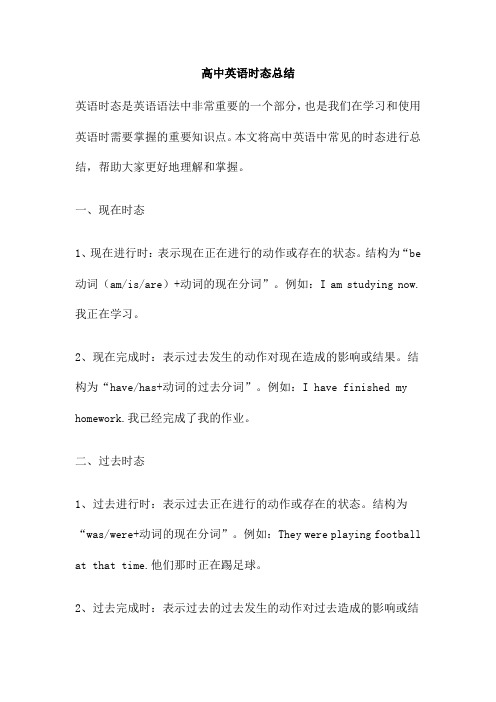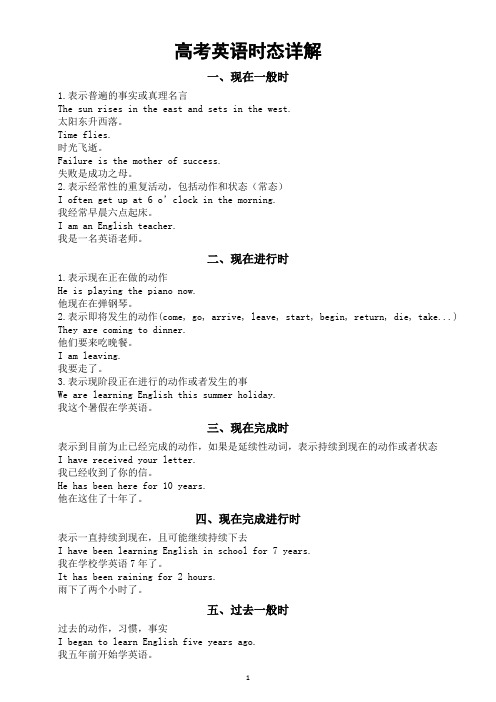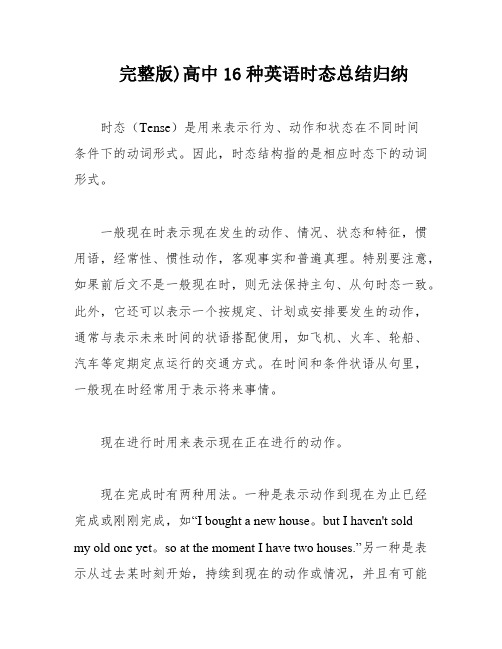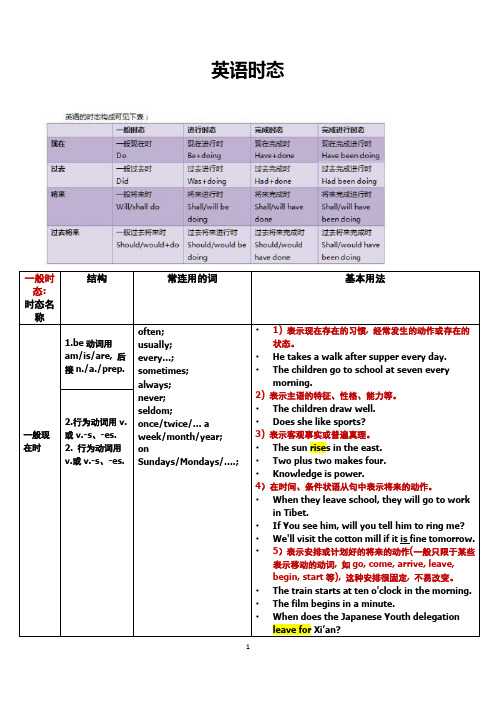高中英语时态讲解
高中英语时态全版.ppt

Tom is seeing his friend off at the airport.
.精品课件.
16
过去进行时 表示过去某一时刻或某一段时间内正在进行 的动作。这一特定的过时间可用时间状语表 示
He was watching TV when I came in.
---What were you doing this time yesterday? ---I was writing a letter.
I will study hard to keep up with my classmates.
He won’t do it.
You shall have the book.
.精品课件.
8
2.be going to + 动词原形:含有打算、计划、 准备将做某事的意思,或表示很有可能要发 生的事。
3.若表示已安排或计划好的将来动作或存 在状态,可用一般现在时代替一般将来 时,其谓语动词常为be, come, go, arrive, leave, start等
Where shall we meet tomorrow?
.精品课件.
7
注:shall和will除了上述表示单纯的将来外, 还有其他用法。在第一人称后,will常表示 “决心”、“意愿”或“打算”,在否定
句中用于所有人称,有“不愿”的意思。 shall用于第二人称时,可表示说明者的将 来意愿或允诺。
the window.)
.精品课件.
4
7. 由here, there开头的句子,动词 用一般现在时表示正在发生的动 作。如:
There goes the bell.
Here comes the teacher.
高中英语时态总结

高中英语时态总结英语时态是英语语法中非常重要的一个部分,也是我们在学习和使用英语时需要掌握的重要知识点。
本文将高中英语中常见的时态进行总结,帮助大家更好地理解和掌握。
一、现在时态1、现在进行时:表示现在正在进行的动作或存在的状态。
结构为“be 动词(am/is/are)+动词的现在分词”。
例如:I am studying now.我正在学习。
2、现在完成时:表示过去发生的动作对现在造成的影响或结果。
结构为“have/has+动词的过去分词”。
例如:I have finished my homework.我已经完成了我的作业。
二、过去时态1、过去进行时:表示过去正在进行的动作或存在的状态。
结构为“was/were+动词的现在分词”。
例如:They were playing football at that time.他们那时正在踢足球。
2、过去完成时:表示过去的过去发生的动作对过去造成的影响或结果。
结构为“had+动词的过去分词”。
例如:They had finished their work before we arrived.他们在我们到达之前已经完成了他们的工作。
三、将来时态1、将来进行时:表示将来某个时间正在进行的动作或存在的状态。
结构为“will+be动词+动词的现在分词”。
例如:I will be studying at 9 o’clock tomorrow.我明天9点将会在学习。
2、将来完成时:表示将来某个时间已经完成的动作或达到的状态。
结构为“will+have+动词的过去分词”。
例如:I will have finished my homework by 10 o’clock tonight.我将在今晚10点之前完成我的作业。
以上是高中英语中常见的时态总结,希望能够帮助大家更好地理解和掌握英语时态。
需要注意的是,不同的时态有着不同的用法和结构,大家在使用时需要根据语境选择合适的时态。
高中英语高考复习时态详细讲解(共16类)

高考英语时态详解一、现在一般时1.表示普遍的事实或真理名言The sun rises in the east and sets in the west.太阳东升西落。
Time flies.时光飞逝。
Failure is the mother of success.失败是成功之母。
2.表示经常性的重复活动,包括动作和状态(常态)I often get up at 6 o’clock in the morning.我经常早晨六点起床。
I am an English teacher.我是一名英语老师。
二、现在进行时1.表示现在正在做的动作He is playing the piano now.他现在在弹钢琴。
2.表示即将发生的动作(come, go, arrive, leave, start, begin, return, die, take...) They are coming to dinner.他们要来吃晚餐。
I am leaving.我要走了。
3.表示现阶段正在进行的动作或者发生的事We are learning English this summer holiday.我这个暑假在学英语。
三、现在完成时表示到目前为止已经完成的动作,如果是延续性动词,表示持续到现在的动作或者状态I have received your letter.我已经收到了你的信。
He has been here for 10 years.他在这住了十年了。
四、现在完成进行时表示一直持续到现在,且可能继续持续下去I have been learning English in school for 7 years.我在学校学英语7年了。
It has been raining for 2 hours.雨下了两个小时了。
五、过去一般时过去的动作,习惯,事实I began to learn English five years ago.我五年前开始学英语。
完整版)高中16种英语时态总结归纳

完整版)高中16种英语时态总结归纳时态(Tense)是用来表示行为、动作和状态在不同时间条件下的动词形式。
因此,时态结构指的是相应时态下的动词形式。
一般现在时表示现在发生的动作、情况、状态和特征,惯用语,经常性、惯性动作,客观事实和普遍真理。
特别要注意,如果前后文不是一般现在时,则无法保持主句、从句时态一致。
此外,它还可以表示一个按规定、计划或安排要发生的动作,通常与表示未来时间的状语搭配使用,如飞机、火车、轮船、汽车等定期定点运行的交通方式。
在时间和条件状语从句里,一般现在时经常用于表示将来事情。
现在进行时用来表示现在正在进行的动作。
现在完成时有两种用法。
一种是表示动作到现在为止已经完成或刚刚完成,如“I bought a new house。
but I haven't soldmy old one yet。
so at the moment I have two houses.”另一种是表示从过去某时刻开始,持续到现在的动作或情况,并且有可能会继续延续下去。
这时通常使用延续性动词,时间状语常用since加一个过去的时间点,或for加一段时间,或by加一个现在时间。
4.现在完成进行时 (have been doing)现在完成进行时用来描述一个从过去某一时间开始一直持续到现在的动作或状态,或将继续持续到未来。
例如:我们已经处理这个项目一个多月了,一直在进行中。
5.一般过去时一般过去时用来描述过去某个时间发生的动作或情况,或者过去的惯性动作。
例如:这位老人过去常常坐在公园的长椅上看着别人,一坐就是数个小时。
他以前总是每周看望他的母亲。
在句型中使用 "no sooner than"、"___"、"before"、"r to" 等连接词时,主句要求完成时。
例如:今天之前我从未见过那位教授。
在填空题中,句子中的动作已经持续了一段时间,并且需要进行修理。
高中英语时态总结

英语时态一般时态:时态名称结构常连用的词基本用法一般现在时1.be动词用am/is/are, 后接n./a./prep.often;usually;every…;sometimes;always;never;seldom;once/twice/… aweek/month/year;onSundays/Mondays/….;•1) 表示现在存在的习惯, 经常发生的动作或存在的状态。
•He takes a walk after supper every day.•The children go to school at seven everymorning.2)表示主语的特征、性格、能力等。
•The children draw well.•Does she like sports?3) 表示客观事实或普遍真理。
•The sun rises in the east.•Two plus two makes four.•Knowledge is power.4)在时间、条件状语从句中表示将来的动作。
•When they leave school, they will go to workin Tibet.•If You see him, will you tell him to ring me?•We'll visit the cotton mill if it is fine tomorrow.•5)表示安排或计划好的将来的动作(一般只限于某些表示移动的动词, 如go, come, arrive, leave,begin, start等), 这种安排很固定, 不易改变。
•The train starts at ten o'clock in the morning.•The film begins in a minute.•When does the Japanese Youth delegationleave for Xi’an?2.行为动词用v.或v.-s、-es.2. 行为动词用v.或v.-s、-es.1.________ a concert next Saturday?2. A.There will be B.Will there be C.There can be D.There are3.It’s good t o see you again, Agnes.— This has been our first chance to visit since from Iran.4. A.you return B.you returned C.you have returned D.returning5.If it ________ tomorrow, we’ll go roller-skating.A.isn’t rainB.won’t rainC.doesn’t rainD.doesn’t fine4.The reporter said that the UFO ___ east to west when he saw it.A.was travelingB.traveledC.had been travelingD.was to travel5.Sorry, I can’t open the door, for I the key to it.A.lostB.loseC.had lostD.have lost6.“What ' s the matter, Ali? You look sad.”“Oh, nothing much.As a matter of fact, I ___ of my friends back home.”A.just thoughtB.have just been thinkingC.was just thinkingD.have just thought7.—Did you expect Frank to come to the party? —No, but I had hoped .A.him comingB.him to comeC.that he comesD.that he would come8.—Bob must be very wealthy.—Yes, he more in one day than I do in a week.A.has been earnedB.had earnedC.earnsD.has earned9.I first met Lisa three years ago.She ___ at a radio shop at the time.A.has workedB.was workingC.had been workingD.had worked10.She _____her keys in the office so she had to wait until her husband ____home.A has left; comesB had left; would comeC had left; cameD left; had come11.Zhao Lan ______already ______in this school for two years.12.A.was ; studying B.will ; study C.has ; studied D.are ; studying---Mr Gorden asked me to remind you of the meeting this afternoon .Don’t forget it !---OK.I ______ .13.A.won't B.don't C.will D.do14.When I reached home, my parents __________their supper.15.A.are having B.have already had C.have had D.had already had16.She __________in this school ________the past ten years.A.was teaching, sinceB.had been teaching, since17.C.would teach, for D.has been teaching, forI first met Tom 10 years ago.He ______ in a radio factory at that time.18.A.had worked B.has worked C.was working D.has been working19.--- What ______ when I phoned you?--- I ______ my work, and I wanted to go out.A.have you done; finishedB.were you doing; have finished20.C.did you do; had just finished D.were you doing; had just finished21.I used to drink a lot of tea but these days I ______ coffee.22.A.prefer B.preferred C.had preferred D.am preferringJim talked for about half an hour yesterday.Never ______ him talk so much.23.A.I heard B.did I hear C.I had heard D.had I heard24.He ___ articles for our wall-newspaper these three years, and he ____ about fortyarticles.A.has been writing; has writtenB.had been writing; wrote25.C.is writing; has been writing D.has written; has written26.When he was alive, the old scientist used to say that knowledge ______ from practice andhe gained his experience by doing a lot of practical work.27.A.was coming B.had come es D.would come28.--- How are you planning to travel to Shanghai?--- I ______ yet, but I ______ taking a train.A.didn’t decide; am consideringB.haven’t decided; consider29.C.haven’t decided; am considering D.hadn’t decided; have considered30.--- Who’s the man over there?--- It’s Jack.--- Oh? ______ in Italy.A.I think he’sB.I’ve thought he’s been31.C.I thought he was D.I’d thought he’d beenI thought Jim would say something about his school report, but he ______ it.32.A.doesn’t mention B.hadn’t mentioned C.didn’t mention D.hasn’t mentioned33.—How long ________ each other before they ________ married?—For about a year.A.have they known; getB.did they know; getC.do they know; are going to getD.had they known; gotWe would like to go and thank him ourselves, but we ________ out his address yet,A.haven’t foundB.hadn’t foundC.didn’t findD.don’t find34.Shirley ________ a book about China last year but I don’t know whether she has finished.A.has writtenB.wroteC.had writtenD.was writing35.—Do you know when Tom ________ from abroad?—Perhaps it will be a long time before he ________ back.A.will come; will comees; will comeC.will come; comeses; comesThe pen I ________ I ________ is on my desk, right under my nose.A.think; lostB.thought; had lostC.think; had lostD.thought; lostHowever hard you ________, you will never succeed in pleasing her.A.tryB.will tryC.should tryD.would try36.By this time tomorrow we ________ the machine.A.have repairedB.shall have repairedC.will repairD.would repair37.I ________ the room to be empty but found it occupied.A.had thoughtB.have thoughtC.didn’t thinkD.was thinking。
高中英语十六种时态

添加标题
定义:一般现在时表示习惯或 常规,通常用于描述经常发生 的动作或状态。
添加标题
用法:一般现在时通常与频度 副词如“always”、 “often”、“sometimes” 等连用,表示某个动作或状态 发生的频率。
添加标题
形式:一般现在时的形式是动 词原形,第三人称单数时在动 词后加“-s”或“-es”。
注意事项:在使 用一般现在时描 述客观事实或普 遍真理时,要注 意避免使用主观 性的词汇或语气, 保持客观和中立 的态度。
定义:表示正在进行的动作或存在的状态
构成:be动词+动词ing
用法:可以表示现在正在进行的动作或存在的状态,也可以表示将来要发生的动作或存在 的状态
示例:I am studying English right now.(我现在正在学习英语。)
,
01 一 般 现 在 时 02 现 在 进 行 时 03 现 在 完 成 时 04 现 在 完 成 进 行 时
定义:一般现在时表示现在发生的动作或状态,常与一般现在时的基本用法相联系 构成:动词原形或第三人称单数形式 时间状语:always,usually,often,sometimes,every day等 基本用法:表示习惯性、经常性、普遍性的动作或状态
构成:have/has+过去分词 用法:动作或状态从过去开始,持续到现在或将来 时间状语:already, yet, just, before, since等 语境:常与现在完成时连用,表示过去的动作对现在造成的影响或结果
定义:现在完成时表示过去发生 的动作或状态对现在造成的影响 或结果。
用法:常与already, yet, just, ever, never等副词连用。
高中英语的时态总结归纳
高中英语的时态总结归纳时态是英语语法中的重要部分,它能够准确地表达动作的发生时间。
在高中英语学习过程中,掌握各种时态的用法对于正确表达和理解英文语境至关重要。
本文将对高中英语中常见的时态进行总结和归纳,旨在帮助读者加深对时态的理解和掌握。
一、一般现在时态(Simple Present Tense)一般现在时态表示经常性动作、客观真理、现象描述等。
其基本结构为主语 + 动词原形。
例如:1. I eat breakfast every morning.(我每天早上吃早饭。
)2. Water boils at 100 degrees Celsius.(水在100摄氏度时沸腾。
)二、一般过去时态(Simple Past Tense)一般过去时态表示过去发生的动作或状态。
其基本结构为主语 + 动词过去式。
例如:1. He studied English in high school.(他在高中学习英语。
)2. They visited their grandparents last weekend.(他们上周末拜访了他们的祖父母。
)三、一般将来时态(Simple Future Tense)一般将来时态表示将来的动作或状态。
其基本结构为主语 + will +动词原形。
例如:1. We will have a party next week.(我们下周将举办派对。
)2. She will visit her friend tomorrow.(她明天将去拜访她的朋友。
)四、现在进行时态(Present Continuous Tense)现在进行时态表示正在进行的动作或现阶段的临时状态。
其基本结构为主语 + am/is/are + 动词ing形式。
例如:1. They are playing basketball in the park.(他们正在公园里打篮球。
)2. I am studying for the exam at the moment.(我现在正在备考。
高中英语时态归纳
高中英语时态归纳英语的时态分为一般现在时、一般过去时、一般将来时、现在进行时、现在完成时、过去进行时、过去完成时、将来进行时、将来完成时等。
下面将详细介绍每种时态的使用规则和特点。
一、一般现在时(Simple Present Tense)一般现在时表示经常、习惯性或普遍存在的动作或状态。
它的常见用法有以下几种:1. 表示客观事实:The sun rises in the east.2. 表示经常或习惯性的动作:I usually go to bed at 10 o'clock.3. 表示现阶段的动作或状态:I'm currently studying at Oxford University.二、一般过去时(Simple Past Tense)一般过去时表示过去发生的动作或状态。
它的常见用法有以下几种:1. 表示过去某个确定的时间发生的动作:I went to London last week.2. 表示过去的习惯性动作:When I was a child, I played soccer every day.3. 表示虚拟条件的句子(如果引导词是If):If I had money, I would buy a car.三、一般将来时(Simple Future Tense)一般将来时表示将来某个时间会发生的动作或状态。
它的常见用法有以下几种:1. 表示将来某个确定的时间发生的动作:I will meet my friendtomorrow.2. 表示未来的预测、打算或意愿:I hope she will come to the concert.3. 表示对某个事件的推测或猜测:I think it will rain later.四、现在进行时(Present Continuous Tense)现在进行时表示现在正在进行的动作。
它的常见用法有以下几种:1. 表示现在进行的动作:I am studying English at the moment.2. 表示现阶段的习惯性动作:He is always complaining about his job.五、现在完成时(Present Perfect Tense)现在完成时表示过去发生的动作对现在造成的影响或状态,或者表示过去发生的动作具有的持续性。
高中英语16种时态用法讲解(附例句)
高中英语16种时态用法讲解(附例句)1. 一般现在时 simple present tense用法:A) 表示现在发生的动作、情况、状态和特征【例】My father is not home yet. 我父亲还没回家.She is a student. 她是一个学生。
B) 经常性、习惯性动作,常与表示频度的副词连用,如always,often,seldom等【例】He always eats an apple in the morning. 他常常在早上吃一个苹果。
C) 表示客观事实和普遍真理The earth moves around the sun. 地球绕太阳转动。
D) 表示按计划安排好的,或将要发生的动作,可用一般现在表将来,但仅限于start, leave, go, arrive, begin等单词【例】The train leaves at 3:00 p.m.. 火车三点发车。
The show begins in half an hour. 半小时后演出开始。
E) 在时间和条件状语从句中,主句是将来时,从句通常用一般现在(有时也用现在完成时)表示将来事情【例】I will go to bed when he comes back. 等他回来了我就去睡觉。
If you don't stop the yelling, I will leave right now. 如果你还继续大吼大叫的话,我现在就走。
2. 现在进行时 present progressive tense用法:A) 表示说话时正在进行的动作【例】They are having lunch. 他们在吃饭。
B) 表示现阶段正在进行的动作【例】We are looking for a new house. 我们现在在找新房子。
3. 现在完成时 present perfect tense用法:A) 表示动作到现在为止已经完成或刚刚完成【例】I have just finished my homework. 我刚刚才写完作业。
高中英语时态语态讲解 PPT
3、 ---Nancy is not ing tonight、
进行体: 它具有暂时性、持续性、未完成性得特点。 现在进行时: 表示此刻或现阶段进行得动作。 过去进行时: 用来表示过去特定得某一时刻正在发生或过 去某一段时间内持续发生得事情。
closes、
3、 进行时将来:表示计划、安排要做得事。如: •I’ve won a holiday for two days to Florida、 I am taking my mum、 •— What were you doing when Tony phoned
you ?
— I had just finished my work and was starting to take a shower、
得不定式被动式有特殊得用法。
• The news is to be found in the evening paper 、
• He is nowhere to be seen、 • You are to be congratulated、 应当向您表示祝
贺。
5、 will/shall will得特殊用法:可以用于表示事先未考虑过, 即说话时临时想到得。 Eg、 ---you’ve left the light on、
1、 All morning as she waited for the
medical report from the doctor, her
nervousness 、
A、has grown
B、is growingC、grwD、had grown
2、 My mind wasn’t on what he was
- 1、下载文档前请自行甄别文档内容的完整性,平台不提供额外的编辑、内容补充、找答案等附加服务。
- 2、"仅部分预览"的文档,不可在线预览部分如存在完整性等问题,可反馈申请退款(可完整预览的文档不适用该条件!)。
- 3、如文档侵犯您的权益,请联系客服反馈,我们会尽快为您处理(人工客服工作时间:9:00-18:30)。
5
一般将来时
The Simple Future Tense
表示将来某个时间会发生的动作或情况,常和表示将 来的时间状语连用 其他将来时的表达方式: 1)be going to do… 表示打算、计划、决定要做的事;“有迹象表明或预示 着将发生……… Look at the dark clouds; it’s going to rain. 看那乌云,快要下雨了。
2)be about to do… 表示眼下马上就要发生的动作 He is about to leave for Beijing. 他马上要去北京。
3) be +to do… 表示计划中约定的必须将发生的行为; 按职责义务必须去做的事情/要发生的动作 You’re to deliver these flowers before 10. 你在10点钟之前把这些花送去。 4)be+doing 主要用于go, come, leave, start等表示去向的短暂性动 词。 I’m leaving tomorrow. 明天我要走了。
十六种时态
9 现在完成时 10 过去完成时 11 将来完成时 12 过去将来完成时
13 现在完成进行时 14 过去完成进行时 15 将来完成进行时 16 过去将来完成进行时
1
一般现在时
The Present Simple
1. 表示经常发生的动作,存在的状态或日常习惯。 常与 every day,often,usually,always, sometimes等时间状语连用。 I go to school every week. 2. 永恒的真理或者客观事实 The sun rises in the east. 3.名言警句 Pride goes before a fall
5)在“祈使句+and/or+陈述句”句型中,陈述句中只能 用will或情态动词加动词原形。 Work hard, and you will pass the exam. 努力学习,你就会通过考试。
6
过去将来时
The Past future tense
基本结构 : would/ Should +动词原形
常见瞬时性动词和延续性动词(状态)的转换
1.die--be dead
2. borrow--keep
3.leave--be away from leave
4.buy--have
5.begin--be(on)
6.join--be a member of / be in
7.become--be
8.Open\close--be open
2. 在含有时间状语从句的复合句中,延续时间较长的 动作要用过去进行时,而另一个动作用一般过去时。 When I entered the room, she was sitting at her desk. 我进屋的时候,她正坐在书桌前面。
3.瞬间动词come,go,leave,reach,return, start,arrive,die等的过去进行时,可以表示过去将 要发生的动作。(用过去进行时,来代替过去将来时 ) He said the train was leaving at six the next morning.
(表过去习惯性的动词,也可用would/ used to do 句型) 他过去常乘公共汽车去上班。 He used to/ would go to work by bus.
4
过去进行时
The Past Continuous Tense
1.表示过去某一时间正在进行的动作.通常有时间状语 Mary was listening to light music 10 minutes ago.
17.Turn on/off--be on/off
2. 过去发生的动作对现在产生影响 I have seen this film twice I saw this film yesterday.(有明确过去时间状语用 一般过去时)
常见现在完成时时间状语
in/over the past+时间段 在过去的一段时间中
2
现在进行时
The Present Continuous Tense
1. 表示说话时正在进行的动作 Someone’s knocking at the door.
2. 表示现阶段内正在进行的动作,但说话时动作未必 正在进行。 He is teaching at a night school.
3.现在进行时用来表示按计划即将发生的动作(用现 在进行时表示将来。常用于:come, go, stay, arrive, leave,die, start, begin, return,move,walk,fly ) He’s arriving tomorrow morning.
2.如果主句是祈使句,那么从句通常要用一般现在时 Don’t laugh at me when I make a mistake. 3.如果主句是含有情态动词的一般现在时,根据需要从 句多用一般现在时 You should be quiet when you are in the reading 4.如果if的条件状语从句遇到变换间接和直接时 , 祈使句 应用not to.... She said not to close the window
3
一般过去时
The Simple Past Tense
1. 表示过去发生的,和现在没有联系的动作或状 态.(常与表示过去时间的时间状语连用 I lived in London many years ago
2.表示过去经常性或习惯性的动作。(常和often, always等表示频度的时间状语连用) We often played badminton together when we were children.我们小时候常在一起打羽毛球。
4.现在进行时与always, continually , constantly, never 等频度副词连用,连用,表达厌烦、愤怒、抱 怨、赞扬等情感。
你总是忘记这些重要的事情。(表责怪,不满) You are always forgetting the important things. 他总是学习很用功。(表赞赏) He is always working hard. 这个男孩上课老说话。 The boy is always talking in class.
before(单独使用) 曾经 just(肯定)刚刚
ever (否定或疑问)曾经 recently/lately 最近
yet (否定或疑问)已经,仍然
already (肯定)已经
so far/up to now/till now 到目前为止
for+时间段
+过去时间状语 since four years ago
常见的主将从现的状语从句连词有: ①表示时间的:when, untill, as soon as, before, after, by the time, next time; ②表示条件的:if, unless, as/so long as; in case, only if, suppose/supposing that...; providing/provided that...; ③表示让步的:even if/though; whatever(however, wherever...); no matter what (how, where...)
(时间段)
×
open(v.)(瞬时性动词)→open(adj.)(状态)
This shop has been open for five days. √
I have bought(瞬时性动词) that book for six days
(时间段)
×
buy(v.)(瞬时性动词)→have(v.)(延续性动词)
经常以“过去”为背景,要想表达比这一背景更早的 动作,即“过去的过去”,常用此时态。
4.表示能力 Ann writes good English but doesn’t speak well.
5. 在条件或时间状语从句中如果表达将来(主将从现) If it is fine tomorrow, we will go on a picnic.
6.表示按规定、计划及安排要发生的情况. (一般用于be, come, go, start, begin, leave, arrive, return等动词中) The plane takes off at ten.
I have lived(延续性动词) here since the year of 2010.(时间段)
This old man has died(瞬时性动词) for two
years.(时间段)
×
die(v.)(瞬时性动词)→dead(adj.)(状态)
This old man has been dead for two years. √
since
+过去式
since I was a boy
次数(never,twice,four times...)
these days 目前,现今
8
过去完成时
The Past Perfect tense
1.表示动作在过去某一动作之前已经完成。 They had got everything ready before I came.
This shop has closed(瞬时性动词) for three days.
(时间段)
×
close(v.)(瞬时性动词)→closed(adj.)(状态)
This shop has been closed for three days. √
This shop has opened(瞬时性动词) for five days.
